Medusa ERP Integration Case Study: How We Connected Medusa with Base.com
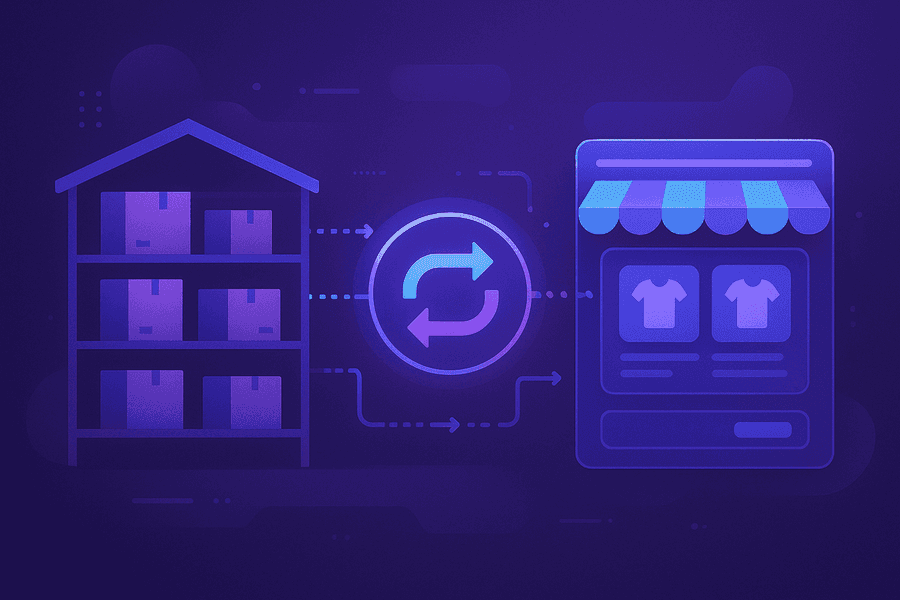
If you're running an e-commerce business, you know the pain: your products live in your ERP system, but your online store needs constant updates. Inventory changes, new products arrive, prices fluctuate, and orders need to flow back to your warehouse management system.
The manual approach is a nightmare:
- Hours spent copying product data between systems
- Inventory discrepancies leading to overselling
- Order details manually entered into your ERP
- Human errors causing fulfillment delays
- Scaling becomes impossible as your catalog grows
For businesses using Medusa as their e-commerce platform, the challenge is finding the right integration that keeps everything in sync without breaking the bank or requiring a team of developers.
Why Medusa + ERP Integration Matters
Medusa is a powerful, modern e-commerce framework built for customization. However, Medusa is rarely the only system in your business — you often need to connect it with your existing business tools, especially your ERP.
Proper ERP integration transforms how your business operates. With real-time inventory accuracy, you'll never oversell products or waste time on manual stock updates. Automated product management means that when you add new products to your ERP, they appear in your store automatically with all their descriptions, images, and pricing intact. Orders flow seamlessly from checkout to your warehouse, eliminating the bottleneck of manual data entry and the costly errors that come with it. Perhaps most importantly, this automation enables true scalability — your business can grow from hundreds to thousands of products without requiring additional staff to handle the data synchronization.
What Can Be Synchronized
A proper Medusa-ERP integration should handle the complete product and order lifecycle. Starting with products, the integration synchronizes everything from product titles and descriptions to images, media assets, categories, collections, and custom attributes that make your catalog unique.
Pricing is another critical component — the system maintains base prices and sale prices across multiple currencies, handles tax configurations automatically, and applies volume discounts and pricing rules consistently across both platforms.
For inventory management, the integration tracks real-time stock levels across multiple warehouses, maps stock locations between systems, triggers low stock alerts when needed, and manages inventory reservations to prevent overselling.
Finally, order synchronization creates orders automatically in your ERP the moment they're placed in Medusa, transferring customer information and shipping details seamlessly. The integration keeps order statuses updated in real-time and tracks both payment and fulfillment progress throughout the entire order lifecycle.
Integrating Medusa with Base.com ERP
Base.com (formerly BaseLinker) is a popular ERP system used by thousands of e-commerce businesses. It provides comprehensive tools for inventory management, order processing, multi-channel sales, and warehouse operations.
The Challenge
Businesses running Medusa with Base.com face several synchronization challenges. Managing thousands of product variants across systems becomes overwhelming without automation. Keeping inventory accurate across multiple warehouses in real-time requires constant vigilance. Orders need to flow automatically from the storefront to the ERP for fulfillment. Product pricing and descriptions must stay synchronized without manual updates. The scale and complexity of modern e-commerce catalogs make manual synchronization impossible.
The Solution: @u11d/medusa-base Plugin
To address these challenges, we built an open-source Medusa plugin that handles bidirectional synchronization between Medusa and Base.com. The plugin provides automated product synchronization with a simple API endpoint that fetches everything from product information (titles, descriptions, images) to all product variants and options, pricing across different markets, and stock levels from all connected warehouses. An intelligent mapping system uses helper database tables to maintain relationships between Base.com and Medusa, ensuring data consistency and enabling fast lookups during synchronization. The real-time order creation feature automatically captures order details, maps Medusa products to Base.com product IDs, creates the order in Base.com with the correct status, and updates inventory across both systems. Finally, scheduled synchronization allows you to set up automated syncs on your preferred schedule, running continuously in the background.
How It Works in Practice
The workflow is straightforward. Your team manages the product catalog in Base.com ERP, where they add new products, update descriptions and specifications, manage inventory across warehouses, and set prices and promotional offers.
Product Synchronization
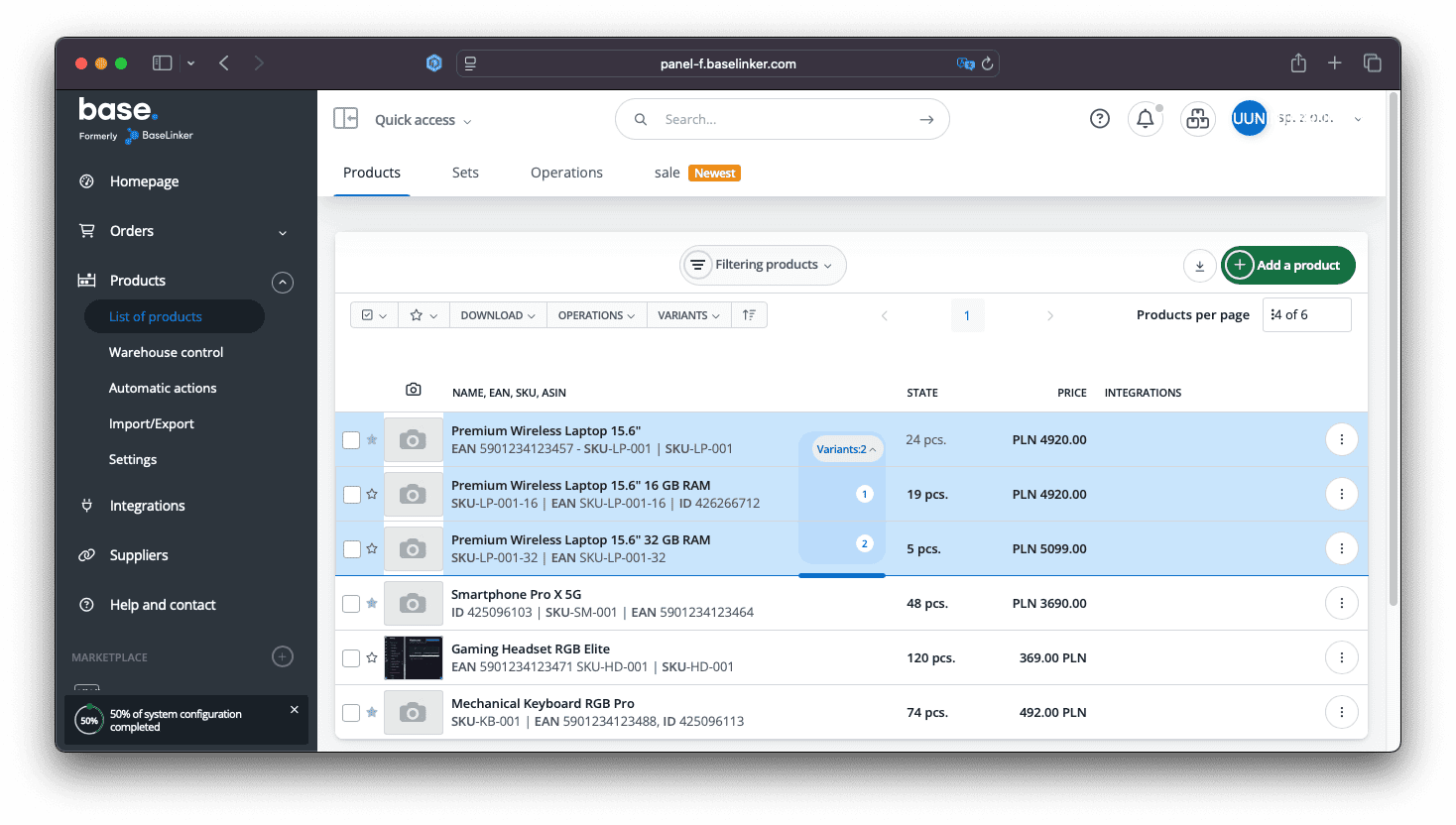
The plugin runs on schedule or on-demand, pulling all changes automatically — new products appear in your Medusa store, product details are updated, prices sync across all variants, and inventory levels reflect real-time warehouse data.
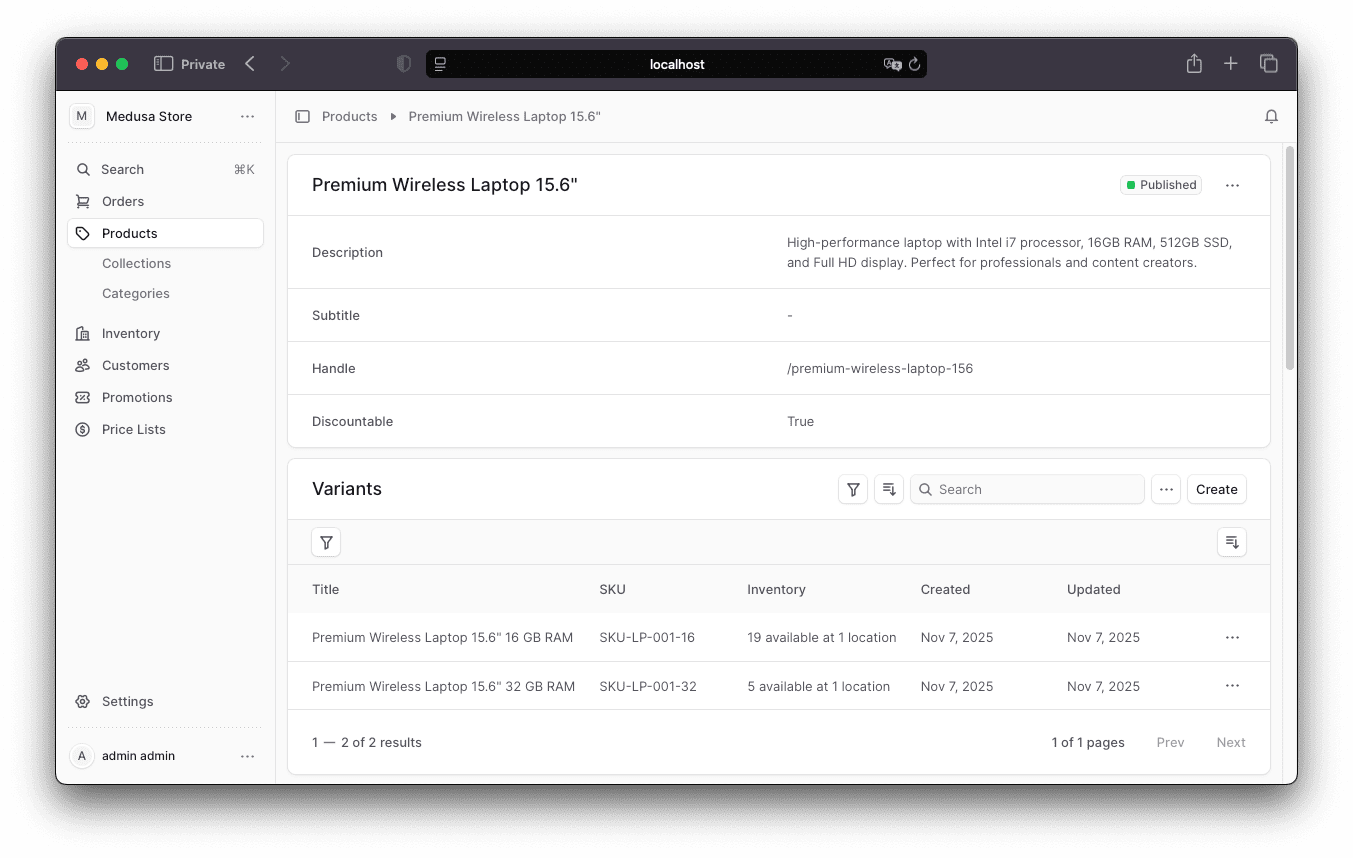
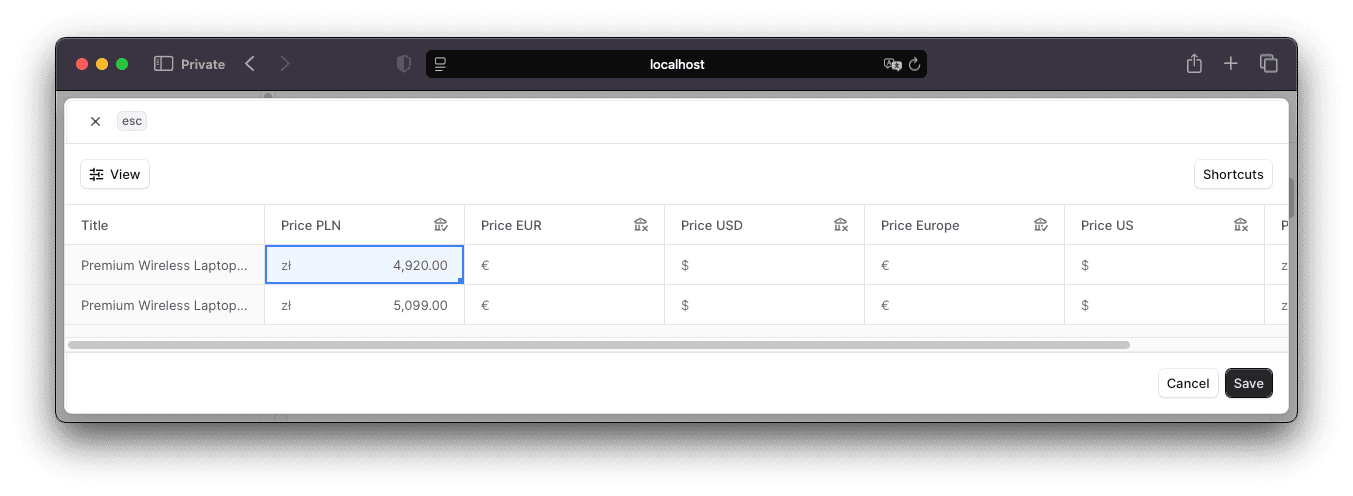
Order Flow
When a customer completes checkout, the order is captured in Medusa with all details.
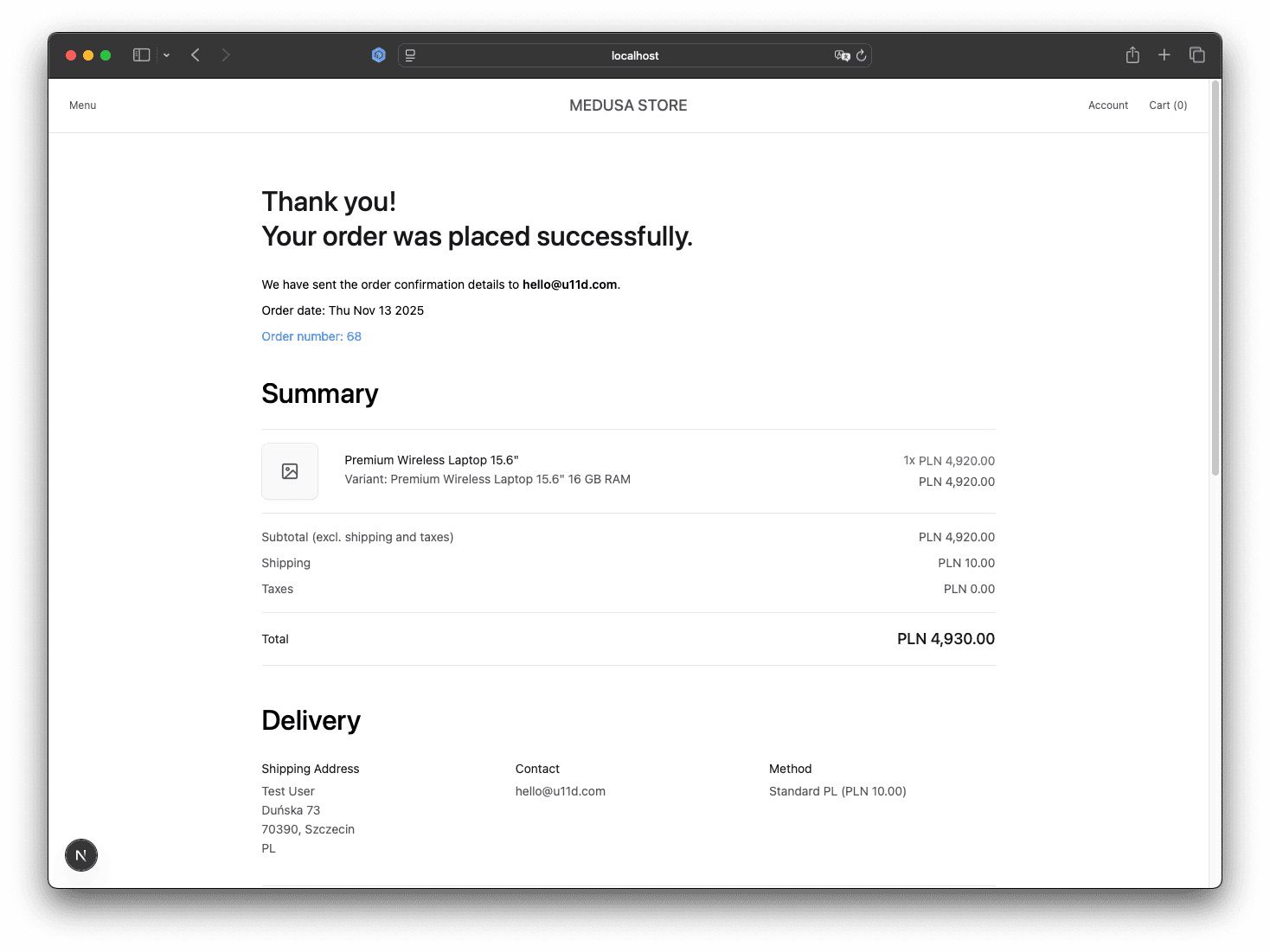
The plugin automatically creates the order in Base.com, enabling the warehouse team to begin fulfillment immediately.
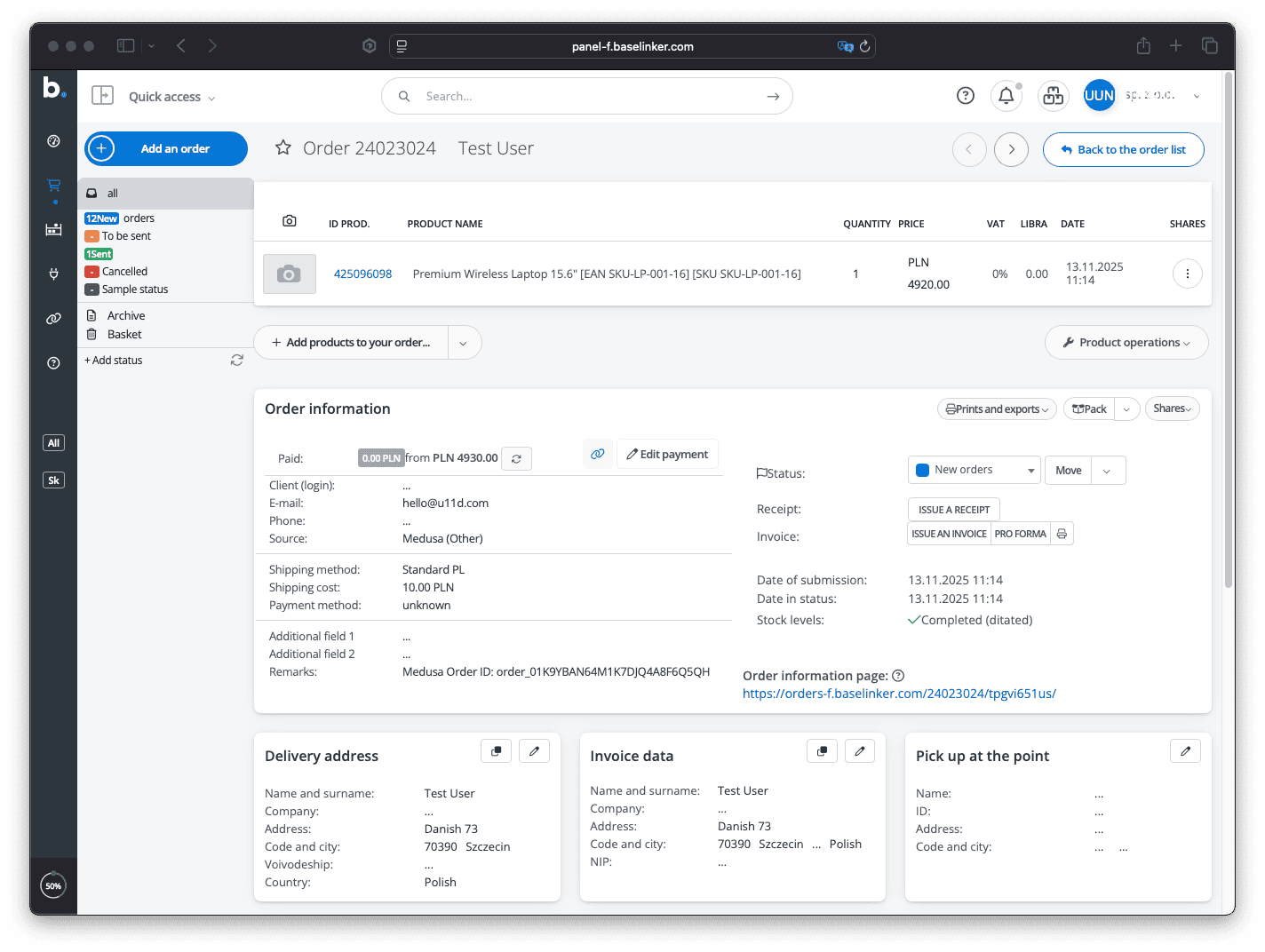
Results and Benefits
The integration delivers measurable benefits: synchronization handles over 10,000 products in minutes with 100% inventory accuracy, saves 20+ hours per week on manual data entry, scales seamlessly as your catalog grows, and creates orders in your ERP within seconds of checkout.
Beyond Base.com: Custom ERP Integrations
The Base.com integration is just one example of what's possible. The same approach works for virtually any ERP system, including enterprise-grade solutions like SAP Business One for mid to large businesses, Microsoft Dynamics as a comprehensive business management suite, and NetSuite for cloud-based ERP and financial management. We also work with Odoo, the popular open-source ERP for growing businesses, as well as custom proprietary or legacy systems. If your system has a REST API or any accessible interface, we can build an integration for it.
Extending the Base.com Plugin
Already using Base.com but need additional features? We can extend the plugin with custom field mappings to handle your unique product attributes, advanced pricing rules for complex business models, sophisticated multi-warehouse logic, B2B customer-specific pricing tiers, integration with additional Base.com modules beyond the core functionality, and custom synchronization schedules with filters to sync only what you need.
Why Choose u11d for Your ERP Integration
We bring deep expertise in the Medusa ecosystem as active contributors who understand the framework inside-out. Our integrations follow Medusa best practices and are built for long-term maintainability. Beyond technical skills, we understand e-commerce operations, inventory management, and the challenges of scaling an online business.
Our commitment to open source is evident in our Base.com plugin, which is fully available on GitHub and npm. We believe in transparency and community-driven development. With a proven track record of building integrations for payment providers, shipping carriers, ERP systems, and custom business logic for e-commerce brands around the world, we provide end-to-end support from initial consultation to deployment and ongoing maintenance.
Ready to Integrate Your ERP with Medusa?
Whether you're looking to connect your store with an ERP system, build custom integration features, implement business-specific sync logic, migrate from another platform to Medusa, or improve the performance of your current integrations — our team can support you at every step. Let’s talk about your integration requirements. We’ll analyze your setup and outline a clear plan to move forward.





